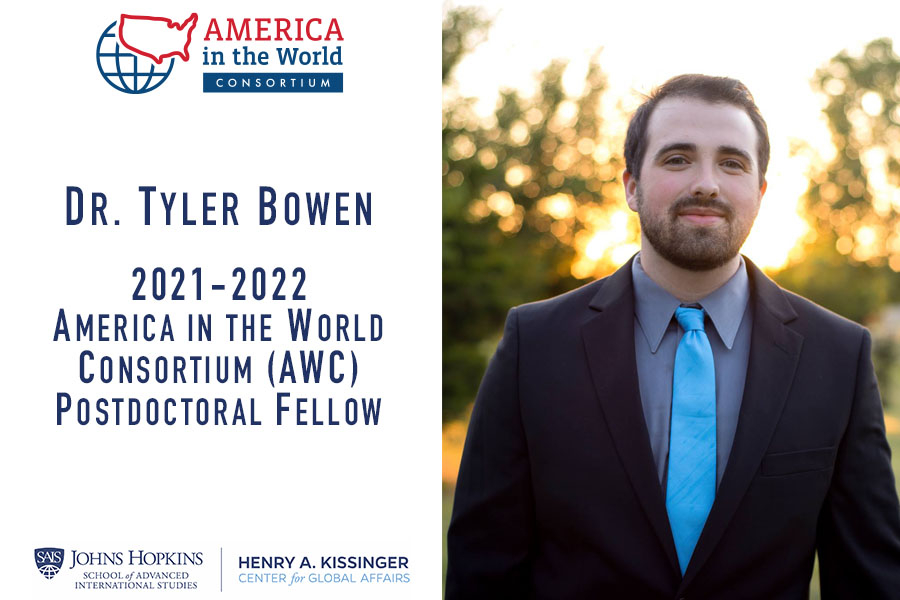Featured Scholar: Dr. Tyler Bowen, 2021-2022 AWC Postdoctoral Fellow

In this Featured Scholar article, the Henry A. Kissinger Center for Global Affairs spoke with Dr. Tyler Bowen, a 2021–2022 America in the World Consortium (AWC) Postdoctoral Fellow at the Center, to learn more about his ongoing work on U.S. strategic defense allocation.
Dr. Tyler Bowen is a Postdoctoral Fellow in the America in the World Consortium, focusing on how nuclear weapons affect U.S. foreign policy. His dissertation, entitled, "The Logic of Escalation and the Benefits of Conventional Superiority in the Nuclear Age," explains how nuclear weapons shape the benefits of conventional military superiority for the United States and other great powers. He received his Ph. D. in Political Science from Yale University in 2021, and he most recently worked as a Stanton Nuclear Security Predoctoral Fellow at MIT in 2020-2021. His other research projects examine questions of public opinion around nuclear use, the nature of nuclear superiority, the sources of deterrence failure, and the utility of military strikes against nascent nuclear programs.
Why does the United States allocate such a large proportion of funding to conventional forces, especially if nuclear weapons present a strong deterrent in international security? This is a key question Dr. Bowen seeks to investigate in his research as a 2021–2022 America in the World Consortium (AWC) Postdoctoral Fellow at the Henry A. Kissinger Center for Global Affairs. The project originated from another line of investigation during Dr. Bowen’s doctoral studies at Yale University. Working with his dissertation advisor, Professor Alexandre Debs, Dr. Bowen initially focused on the benefits of unipolarity for the United States but found that the two issues were related.
After defending his dissertation on conventional force buildup in the context of nuclear weapons’ deterrent power and receiving his Ph.D. in Political Science from Yale in June 2021, Dr. Bowen is now turning his work on strategic military allocation into a book and policy-relevant insights in East Asia. As the United States spends more than $700 billion on defense, which is largely allocated to conventional forces,[1] Dr. Bowen points out, “That’s a choice. Is it the right allocation choice?” Dr. Bowen’s work explores the strategic deployment of conventional forces, particularly in East Asia and Europe, and he aims to develop recommendations for U.S. defense policy.
“Working at the [Kissinger Center] is a great experience. Being a postdoctoral researcher can be a lonely experience, so I have found it helpful to be able to go into an office space to do work when I need it. It is also valuable to have the institutional support around you to allow you to take the steps needed to turn a research project from an idea into a reality.”
During his time in Washington, Dr. Bowen has also engaged with the wider SAIS community to develop his grand strategy-focused, policy-relevant work on U.S. military priorities in East Asia and Europe. Most recently, Dr. Bowen hosted a workshop on a draft of his book, with the generous support of the America in the World Consortium, in March 2022. Dr. Bowen found the experience to be extremely helpful as he transforms his dissertation into a book and begins revisions. Dr. Bowen also presented his paper, “The Benefits of U.S. Conventional Superiority in a Nuclear World and U.S. Grand Strategy,” based on this research as a participant on the American Foreign Policy and Grand Strategy panel at the ISS-ISSS in mid-November 2021 at Indiana University, Bloomington.
Dr. Bowen has also worked with graduate student colleagues at the Institute for Data at George Washington University to explore public opinion on the use of nuclear weapons through a survey experiment. He and his co-authors recently published an article based on their work on public opinion in the use of nuclear weapons in The Journal of Politics (“Public Opinion and Nuclear Use: Evidence from Factorial Experiments”). In their research, Dr. Bowen and his co-authors found that the public's response to the potential military advantages of nuclear use depends on the portrayal of the negative consequences of nuclear weapons.